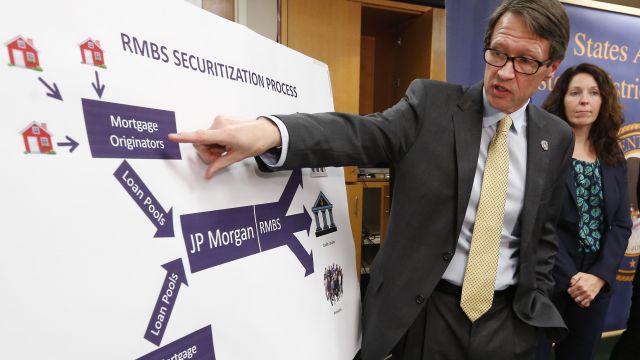
While the Justice Department has not criminally prosecuted any senior banking executives for their role in the housing crisis, they’ve had no problem going after the small-timers.
On this week’s show, Bill spoke to veteran bank regulator William K. Black about the significance of a recent ruling handed down by a federal jury in Sacramento acquitting four allegedly fraudulent mortgage borrowers of criminal charges.
Their ruling came after testimony from Black that the executives at their banks knowingly made fraudulent loans for their own personal, financial benefit.
“This is the first that a jury has ever got to hear what actually caused the crisis,” Black, who testified for the defense in the case, told Moyers. “And the jury was horrified, because it was the lenders who deliberately made massive amounts of fraudulent loans and then sold these massive amounts of fraudulent loans through additional frauds to the secondary market and eventually brought down the global financial system.”
Salon’s Thomas Frank writes that the case appeared to be a routine one, but the defendants’ strategy turned it into something else.
The case started as a routine mortgage-fraud prosecution, brought by none other than the aforementioned U.S. Attorney Benjamin Wagner. A group of eastern European immigrants had bought houses in California in 2006, in a real-estate market that was in the early stages of collapse. According to the indictment, filed in 2012, these people’s mortgage applications contained blank spots and wrong information; they were accused of getting the mortgages in order to sell the houses to one another at pumped-up prices in what is called a “straw buyer” scheme. Also, they defaulted on the loans.
However, members of the immigrants’ legal defense team — several of them appointed by the state — had read the newspapers over the years and were aware of the kinds of things that had gone on in real estate during the bubble. They knew, for example, that in the go-go days of the last decade, the mortgage origination industry routinely cranked out “stated income” loans — also known as “liar’s loans” — to people who were obviously unable to make the payments. The bankers back then almost never checked on whether the borrower was telling the truth about their income; they just wanted to make the loan. So the defense team in Sacramento came up with a novel strategy: How can the borrower have committed fraud on a mortgage application if the lender didn’t care whether their answers were truthful?
And lenders so didn’t care back in the bubble days. They invented liar’s loans and blanketed the country with them during the Oughts not because the poors talked them into doing it, or because the liberals in the Bush Administration forced them to do it — on the contrary, the government warned them against issuing these things, just as the government warns us against swallowing arsenic. The reason bankers did it was because liar’s loans were making bankers rich.
This is a difficult thing to understand—indeed, not understanding it is the stated reason Obama Administration officials have made no effort to send financiers to jail — so let us take this slowly. Executives at the mortgage origination companies got huge bonuses in those days for writing lots of loans. OK? They wanted to write more of them, and the only way to really crank out mortgages on a vast scale was by giving one to anyone who wanted one, regardless of their ability to pay, a feat that is only possible by means of the “liar’s loan.” So: Liar’s loans = rich bankers.
Also don’t miss: Michael Hiltzik’s summary of the case in The Los Angeles Times »

